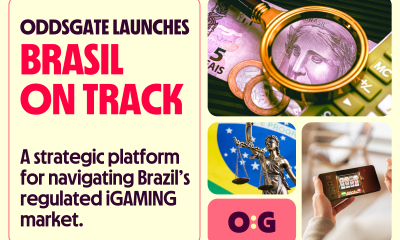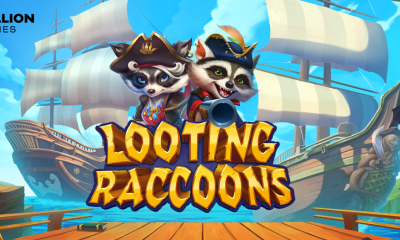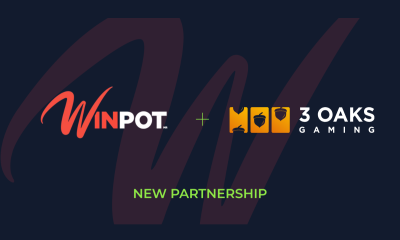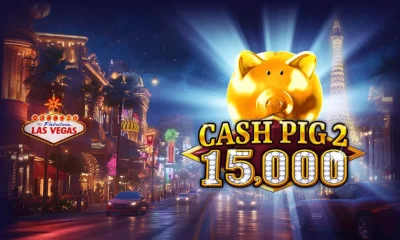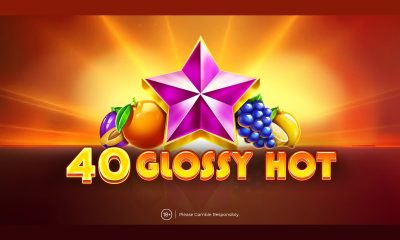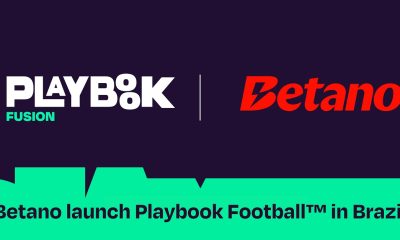Uncategorized
Exclusive Q&A with Paul Sampson, CEO of Lickd

One quick thing that came to mind after conducting the interview was: this man knows the industry. So Ladies and Gentlemen, meet Paul Sampson, CEO of Lickd.
For starterrs, Lickd is a micro-licensing and music solutions company that caters to the creator economy. If that sounds obscure, jump straight to the interview, where Paul Simpson talks in simple terms about Lickd and the present and future of the online music industry.
Q. Let’s start with a brief personal profile. Tell us about your background and career?
A. I’ve been working in music licensing since 2005. I’ve worked specifically with stock music, commercial music, and more recently, exploring ways of strengthening the creator economy.
For around five years, straight out of university, I worked in television at a small production company, climbing through the ranks. Throughout this time, I encountered the difficulties of licensing music several times, and so began to take an interest in understanding the nuances and problems that needed solving.
I’d gotten to know several renowned music licensing companies, and in 2005, one of them, Extreme Music, offered me a job in New York and with that, I followed my passion and began my career jump into the music industry. Within about two and a half years in the role, they relocated me out to Los Angeles as the Head of US.
In 2010, a new role brought me back to Europe and I was a key figure in launching the European arm of another U.S. music licensing company. This time, it was not just stock music, but a focus on more commercial music, and unsigned independent acts.
After this, I knew it was time to start acting on the music opportunities that were becoming more prevalent with the boom of the creator economy, and so following that channel, Lickd was born in 2017.
Q. Now let’s move on to Lickd. What led you to found Lickd?
A. Two words led me to found Lickd: Creator Economy. As social media became more prevalent in everyday life in the late 2000’s, the opportunities for music and creators were plentiful and so Lickd was born. A few years later, as the effects on the media landscape following the pandemic have increased the creator economy twofold, we see even more opportunities to continue to seize the moment, and the market.
Lickd is the first music company to ever develop a major music solution for content creators of all kinds. We licence music from major labels and publishers, including current music that’s in the charts and make it available for licensing, legally. Our unique software protects our users on the platform that they place music on, for example, YouTube and Instagram. Platforms like YouTube have built in music recognition software that identifies popular music being used in content, and presumes that all music uses are some sort of infringement of copyright, therefore, persecuting the creator and attempting to police them out of earning revenue.
Lickd’s software is really the magic solution that the platform sits on top of to ensure that not only can creators licence the music but that they’re taken care of and we’re protecting their revenue all the way through to the end of the content journey.
Q. What is Lickd’s specialty?
A. What sets us apart is that we are unique in our offering. We’re working with 10,000+ labels and publishers that are linked to the Lickd platform, including Universal, Warner, Sony, BMG and Kobalt. To engage labels and publishers like that and to preclear their music for any content vertical is something that was once largely thought impossible, but Lickd has made it happen and is helping to secure new revenue streams for creators globally.
Q. Could you talk about your work with key gaming powerhouses?
A. Gaming is obviously an enormous industry, bigger than music and film combined. Any content vertical with that sort of reach has a huge platform, a huge audience to work with and promote music too.
In terms of how Lickd got together with Fortnite and Epic Games; essentially music became part of their engagement strategy, and they started paying more attention to it. Senior teams were asking key questions like: ‘how can we work with artists’ and ‘what sort of artist does our audience want to hear within a game’?
With this comes complexities around licensing and demographics. Gamers who are also content creators often live stream their content or create highlights videos for YouTube. At Lickd, we already know that in-video music on YouTube is an issue and so we collaborate with Fortnite to bridge that gap so that gamers can enjoy the wonderful events that are put on for them, while also being able to then promote and share that content in the ways that they normally would.
Whether this is for ancillary income or additional income on top of a salary, if content creation is a full-time job, Lickd protects creators on those platforms, to enable a more effective creation and lifecycle process for the content they’re publishing.
Q. Could you briefly narrate the content deals you have with music companies and bands?
A. Over the past five years we’ve built a platform that is made up of popular music from 10,000 labels and publishers, including Universal, Warner, Sony BMG and Kobalt. We also work with lots of independent distributors. There’s around 1.4 million songs on Lickd, and another 6 million delivered and waiting to go live. The vast majority of them would be emerging acts and we certainly do our best to help and encourage discovery on the platform.
Q. In what ways does Lickd help creators to monetise their content?
A. I think it’s important to outline that wherever there is opportunity for the music industry online, it will require some sort of micro licensing commercial model, and some sort of proprietary tech, either to enable the licensing or to protect the end user.
That’s where Lickd is perfectly positioned. Our mission is to democratise music for the world’s creators. Our first product looked at creators as video content creators, but as the world changes and the digital landscape evolves, creators will also include builders in the metaverse and big brands on social platforms.
Q. How do you see the possibility of an AI text-to-background-music generator?
A. There’s various ways that AI will impact music. It’s something we’re following closely and it would be foolish for anyone to suggest that any part of the music industry isn’t already seeing some element of business being affected directly by AI. So far we’ve seen AI generated songs, well known songs of one artist being sung in the AI voice of another, and the fact that chords and melodies can be created by simply inputting into an AI, and we’re always expecting more.
The uptake of AI in music creation won’t be instant, but at some point, creators will become of faith with smart tools that allow them to generate music through these new means for use in videos. Although, once created, that music will still need to be licensed, and there will be commercial models that give users access to the tools and/or licensing opportunities for the music created by said tool.
In the metaverse, there will be music collaboration spaces and music production event areas or venues. Generative AI is useful for creating ‘music stems’, and building a sort of catalogue of music elements that can then be used by people collaboratively to start making an entire song – something that was not happening in the past.
An AI can continuously keep churning out new beats and new melodies and new riffs and new instrumental sounds, and people will get together to create music on the fly, and that will require AI generative tools at some scale. I think you’ll see things like musical skins, where Avatars might want their own soundtrack or music identifier. How do I know someone entered the room? Well, I just heard their music handle to signify they’re here. Like boxers have ring walks, there’ll be a version of that somewhere in the metaverse.
We know that there are music metaverses and venues, and metaverse platforms based around music creation already, and there are others on the way. A good example of this is Pixelynx, Deadmau5’s music based metaverse platform. He founded the platform, one that was completely based around the music, but then was acquired by Animoca Brands, a brand with a broad portfolio of web3, blockchain and traditional games, which is a huge web3 holding company, so from launch to exit, Deadmau5 did very well out of the partnership.
Powered by WPeMatico
Uncategorized
GoldenRace launches Goal2Win to bridge the gap between football and numbers

Reading Time: 2 minutes
The world of sports betting and gaming is set for a major shake-up with the launch of GoldenRace’s innovative, new number game, Goal2Win, designed to captivate the massive global football audience. Goal2Win successfully bridges the gap between the universal passion for the “king of sports” and the proven thrill of number-based predictions, offering partners a fresh, high-potential product for monetisation.
Goal2Win is a premium offering that takes the familiar, classic number game format and integrates it with a dynamic, football-centric theme. This unique combination makes the game instantly recognisable yet excitingly new, appealing both to seasoned sports bettors and newcomers seeking an engaging, simplified experience.
Goal2Win is GoldenRace’s proposal to mix innovation and tradition. It offers operators a product that leverages the immense reach of football fandom while delivering the straightforward, engaging gameplay and massive win potential expected from a top-tier number game. It’s a compelling blend of excitement, simplicity, and significant reward potential.
Key features driving engagement and potential winnings:
Goal2Win is engineered for maximum player retention and high stakes, boasting dynamic gameplay and powerful features:
- Multiplier feature: Players can place the same set of bets across an impressive twenty-two consecutive events, significantly driving up potential winnings and ensuring sustained engagement over time.
- Jackpots and Mega Jackpots: The game includes tiered winnings with both standard Jackpots and highly coveted Mega Jackpots, promising life-changing sums and acting as a powerful player motivator.
- Quick picks: For rapid access to the action, the Quick picks option allows the system to randomly select numbers, streamlining the betting process for players.
- Row/Column selector: Enhancing the user experience, selector buttons enable players to easily pick an entire row or column of numbers, simplifying sophisticated betting.
Goal2Win represents a unique opportunity for operators to tap into the immense global football fanbase with a product that is both innovative and instantly recognisable. It stands poised to become a staple offering, driving higher stakes and attracting a broader demographic to the operators’ portfolio.
The post GoldenRace launches Goal2Win to bridge the gap between football and numbers appeared first on European Gaming Industry News.
Uncategorized
PayAdmit partners with Yaspa to integrate Pay by Bank on its payments platform

Reading Time: < 1 minute
Yaspa, the Pay by Bank fintech, today announced a partnership with PayAdmit, the London-based payment software provider and orchestrator used by merchants across eCommerce, iGaming and digital services. The integration brings Pay by Bank to PayAdmit’s platform, giving its merchants a faster, secure, cost-effective way to accept customer payments with real-time confirmation.
PayAdmit offers a modular payments stack that includes White Label, Cashier Service, Payment Bridge and Payment Concierge Service — a high-touch support layer for resolving payment issues in real time. The platform aggregates 350+ global payment methods and provides streamlined onboarding, enabling merchants to go live in as little as 14 days.
Adding Yaspa gives PayAdmit’s clients a high-conversion bank payment option built for speed, conversion and compliance.
Yaspa’s Head of Commercial, Amie Kadhim, said: “PayAdmit moves fast and sets a high bar on payment performance, reliability and checkout experience. We’re excited to power their next chapter with instant bank payments that are speedy, secure and deliver a smooth, mobile-first experience – boosting approval rates and settling funds immediately.”
For PayAdmit’s merchants, the integration with Yaspa delivers:
- Real-time deposit confirmation
- Lower processing costs versus traditional methods i.e. debit and credit cards
- Reduced fraud and chargeback risk with bank-level authentication
- A smoother mobile journey with no card details to key in
Yaspa’s benefits align with PayAdmit’s focus on performance, security and a modern, merchant-friendly toolkit.
Vladyslav Kolodistyi, CEO of PayAdmit added: “Our mission is to give merchants a flexible, future-proof payments stack. Partnering with Yaspa adds a best-in-class, instant bank payment option, so clients get higher conversion with less complexity.”
The post PayAdmit partners with Yaspa to integrate Pay by Bank on its payments platform appeared first on European Gaming Industry News.
Uncategorized
Continent 8 appoints Julia Weygandt as Head of Client Growth & New Business

Reading Time: < 1 minute
Continent 8 Technologies, a leading provider of cutting-edge managed IT solutions designed for the global iGaming and online sports betting industry, announces the appointment of Julia Weygandt as Head of Client Growth & New Business.
Based in Malta, Julia will spearhead strategic initiatives to drive customer growth and capture new market opportunities globally, working closely with the existing Sales team and Practice Leads.
Julia brings over 20 years of experience in gaming, entertainment, and technology, with a proven track record in commercial strategy, international market expansion, and strategic partnerships. Her career includes senior roles such as COO at G Games and Tornado Games, and Head of International Partnerships at GAMOMAT, where she successfully scaled operations and delivered significant revenue growth.
Julia is an active advocate for diversity and leadership in gaming, serving as a Board member for Global Gaming Women and leading partnerships for the Behind the Gloves initiative, which combines boxing and corporate engagement to support charitable causes.
Nick Nally, Chief Revenue Officer at Continent 8 Technologies, commented: “Julia’s appointment reflects our commitment to delivering exceptional value and growth opportunities for our customers. Her deep industry knowledge, commercial acumen, and passion for building strong partnerships make her an outstanding addition to our team. We are excited to see the impact she will have as we continue to expand globally.”
Julia Weygandt, Head of Client Growth & New Business, added: “I’ve known the Continent 8 team for a long time; they are a trusted and respected partner to the world’s leading iGaming operators and suppliers, and I am thrilled to join at such an exciting time. My focus will be on driving client success through innovative solutions and strategic growth initiatives, ensuring we continue to lead in this fast-evolving industry.”
The post Continent 8 appoints Julia Weygandt as Head of Client Growth & New Business appeared first on European Gaming Industry News.
-

 Brasil on Track6 days ago
Brasil on Track6 days agoODDSGATE LAUNCHES “BRASIL ON TRACK”, A STRATEGIC PLATFORM FOR NAVIGATING BRAZIL’S REGULATED IGAMING MARKET
-

 Latest News7 days ago
Latest News7 days agoMillion Games Unveils Looting Raccoons: A Charming Pirate Slot Packed with Features
-

 3 Oaks Gaming7 days ago
3 Oaks Gaming7 days agoStrategic partnership sees 3 Oaks Gaming expand its LatAm footprint with one of Mexico’s fastest-growing operators
-

 0006 days ago
0006 days agoCash Pig 2 Debuts from Booming Games with 15,000 Top Prize
-

 40 Glossy Hot6 days ago
40 Glossy Hot6 days agoAmusnet Releases “40 Glossy Hot”
-

 Compliance Updates7 days ago
Compliance Updates7 days agoRomanian National Gambling Authority Pushes for Urgent Overhaul of Self-exclusion Rules
-

 Amusnet5 days ago
Amusnet5 days agoWeek 6/2026 slot games releases
-

 BETANO6 days ago
BETANO6 days agoPlaybook Fusion launches with Betano in Brazil




